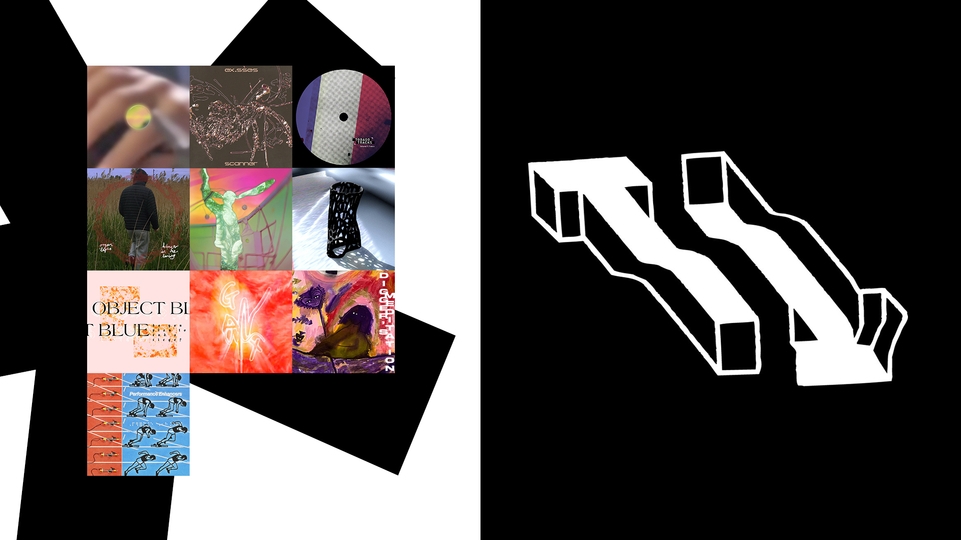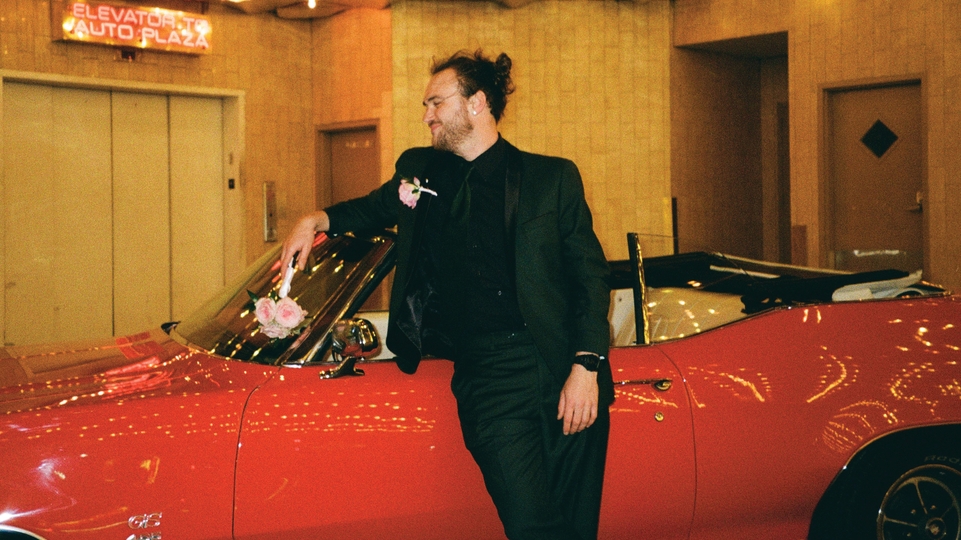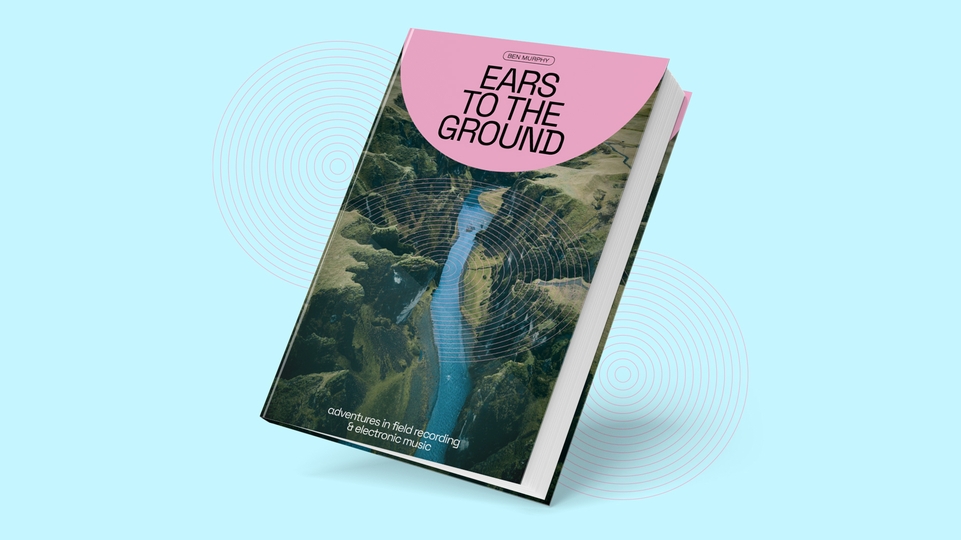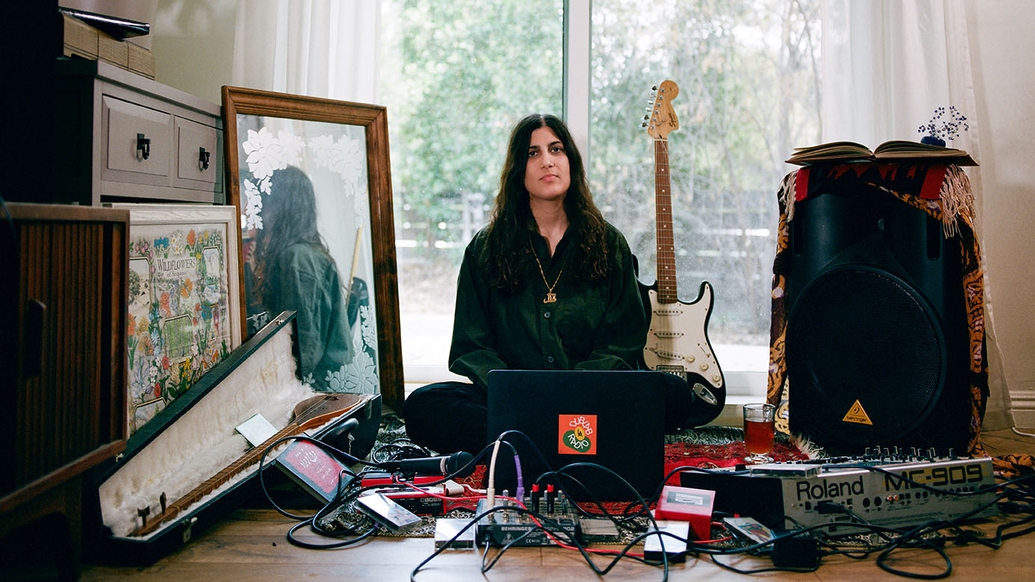
Fresh Kicks 196: Maral
Los Angeles-based, Iranian-American artist Maral celebrates Nowruz – Persian New Year – and the arrival of spring with her 80-minute, genre-spanning Fresh Kicks mix, and speaks to Eoin Murray about sampling, the influence of nature on her music, her unconventional DJing technique, and the inherent beauty of resistance
“Music, poetry and nature: those are the tenets of being Iranian,” says Maral, the Los Angeles-based artist whose innovative releases and DJ mixes merge elements of dub, punk and club sounds with samples from Persian folk, classical and pop music. For the past decade or so, she has nurtured her “folk club” signature in home studios and live venues, seeking to capture the emotional essence of remembered moments from her life, and harness the inspirations conjured by her environment.
It’s a bright spring morning in California when Maral dials in over a video call, her on-screen background displaying a collage work by the Iranian-American sculptor Siah Armajani. Though she’s lived in a few different neighbourhoods of LA since moving from her native Virginia in 2013, two years ago she relocated from the city to the foothills of the San Gabriel Mountains, where she’s been energised by an ease of access to the natural world, more varied weather conditions, and a level of quiet seclusion that she’d craved, all within a 20-minute drive of the downtown area.
“I feel like nature has always been a big part of my life,” she says. “It's such a big part of Iranian culture; a lot of our holidays are around natural events... They require you to go to a park, or go to a river, or go to a body of water... I need it. Every time I walk outside, I’m like, ‘okay, everything is okay, this flower is beautiful, I'm gonna be okay’.”
It was here that Maral wrote her third full-length release for Leaving Records, 2022’s ‘Ground Groove’. The 11-track suite pushes the parameters of her sound into increasingly rugged terrain: tectonic dub beats and industrial drum kit rhythms twist round pillars of distorted electric guitar and bass, giving the LP a distinct, live band-like grit – it’s no surprise that Maral has compared this music to something slowly making its own way straight out of the earth’s core.
Like 2019’s ‘Mahur Club’ and 2020’s ‘Push’, ‘Ground Groove’ is packed with samples from her library of Iranian music, sourced from mixtapes made by her parents in the ‘80s and ‘90s, as well as from family trips to Tehran in her youth, and Persian record stores in LA. Setar lute and ney flute melodies in tracks like ‘Heart Shimmer’, ‘That’s Okay, Ruin It’ and ‘Come Round’ echo like transmissions from an alternate universe, emerging from a portal in the continental crust. Reverb and delay-soaked field recordings and a cappella samples (‘A Walk And A Talk’), as well as Maral’s own FX-altered vocals (‘Hold My Hand, Go For A Walk’) place the album in a hazy state of semi-reality, floating somewhere between the tangible and the imaginary, held together with pummelling percussion and rumbling subs.
Maral is precise about the samples she uses, and the feelings and scenes she wishes to channel through her music. She previously described ‘Mahur Club’ as an attempt to evoke the feeling of being in a taxi in Iran “with the windows down and the taxi driver is playing an old cassette and the sounds from outside are mixing in to create a whole new song”; she has partially credited her love of distortion to the memory of hearing the call to prayer resonating from over buildings in Tehran.
“I feel like I have so much context behind each sound I use and each decision that I make,” she says. “It’s like, I want to sample this section of this song because it makes me feel like I'm walking from my grandmother's house to go get fresh bread in Iran, and I hear this little sound that's coming out of someone's house, and then I hear the call to prayer, and then I'm also listening to my iPod or whatever. I have moments that influence the music, and I try to convey the feeling of those moments, but what comes out is very different from what I'm intending.”
Her varied tastes – from emo, punk and shoegaze to dub, club and indie rock – also inform her approach to production. “I always go into music-making thinking, ‘I just want to make something that makes me feel the same way that seeing Animal Collective live does’ or ‘I want to feel the same feeling I get when I listen to King Tubby’. It's not like I'm trying to make music that sounds like My Bloody Valentine, I'm just trying to capture the feeling that My Bloody Valentine gives to me.”
Though part of her wishes she could guide listeners through the specific relevance of each sample, particularly given the context that is lost for those who don’t understand Farsi vocals, Maral is accepting of the mystery and uncanniness her music can stir, and the fact that, ultimately, the sonic worlds she builds are, above all, for her. “I’ve realised that the reason I keep making music is because I really love the worlds that I create with the songs, and I can't get that feeling from any other music.”
Some of the songs sampled in ‘Ground Groove’ also appear in Maral’s previous releases, but are utilised differently depending on the desired outcome. It’s a technique directly influenced by the Persian modal musical system of Dastgāh, where a song is assembled from a specific selection of melodies, gushehs, performed in a unique sequence to produce a particular mood. “I feel like there's so much to explore, in so many different ways – especially with this music, even in five seconds [of it],” she says. “I’m into reusing and recycling [samples], and that definitely comes from the idea that this repertoire has been passed down for so long. So many people have touched it, yet it can feel so new, if the right person touches it in a certain way.”
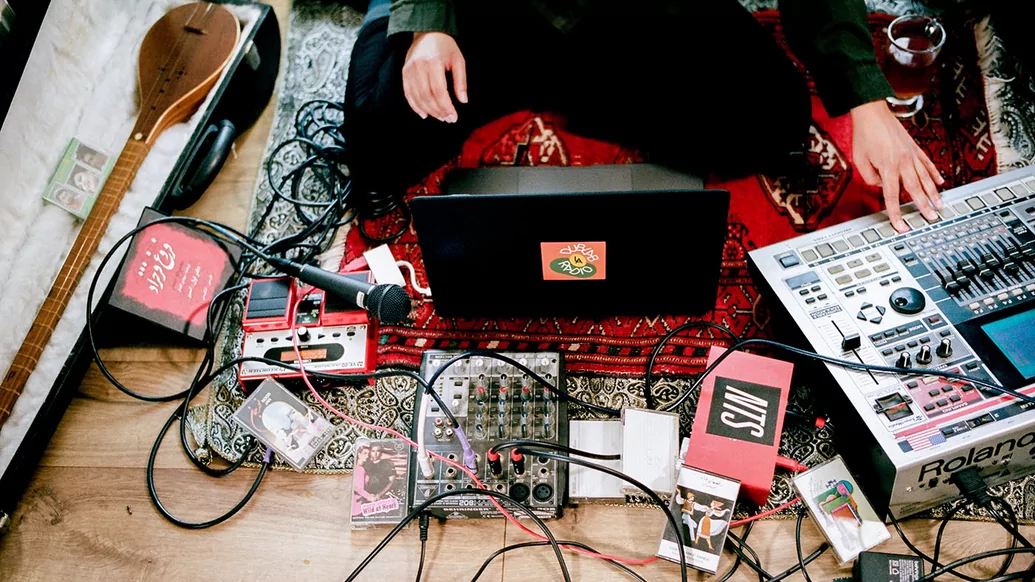
It’s a method she also applies to DJing. Instead of constantly chasing new, exclusive tracks, Maral will often return to familiar favourites – “I use the same Crass track all the time” – but blend them in a new way for an alternative effect. Her club sets and mixes, always made on Ableton, are collages of styles and atmospheres, stitched together, as her own music is, with specific images and emotions in mind.
Maral’s Fresh Kicks mix arrives in DJ Mag’s inbox the day before Nowruz, the Persian New Year celebration that lands on the spring equinox. It’s an absorbing 80-minute excursion that touches on everything from hip-hop, dubstep and blissed-out breaks and to technoid footwork, psychedelic electronica, Baltimore club, and beyond, with some of her own cuts thrown in for good measure. Across 32 intuitively mixed tracks, the prevailing feeling is one of energy and excitement, of light pushing against dark, and the promise of new life.
A recurring character in the mix is the legendary Iranian singer Hayedeh, whose song ‘Bahar Bahar’ appears toward the end, but who is first heard speaking over the Japanese composer Isao Tomita’s shimmering synth rendition of Debussy’s ‘Clair de Lune’. “She always reminds me of Iran, my family and the new year,” says Maral. Conversing in Farsi during a live Nowruz broadcast from her adopted home of Los Angeles in the ‘80s, Hayedeh’s voice disappears in a cloud of dub delay, soon replaced by that of American author Joseph Campbell, who discusses the existence of mysterious, hidden dimensions in the universe, and the divinity of nature.
Maral taught herself to DJ on a cracked copy of Ableton, gifted to her by a friend in Virginia. Inspired by Animal Collective’s psychedelic live transitions, and with no real experience of seeing how DJs would conventionally play, she started playing through her laptop at friends’ house parties and basement shows, mashing-up indie rock and electronic tracks with a liberal use of loops and lashings of delay, reverb and distortion. “I was an outsider,” she says. “My friends were really supportive, but I just didn't know if there was anywhere else for me to go beyond just playing for them.”
After moving to LA, she found that there was plenty of space for her atypical style to flourish. She witnessed DJs like Total Freedom and Kelman Duran perform with a similarly experimental approach – sans controller – and started playing at warehouse parties organised by the Freak City fashion brand, and elsewhere with the Discostan collective, who champion music from the MENA region. Before long, she’d launched her own monthly party, N:}0 Rules, at a bar called Lash with her best friend and frequent visual collaborator Annapurna Kumar, and locked down her own regular show on the Dublab radio station.
Balancing dramatic experimentalism with a firm dancefloor focus in her sets, Maral would sling out moombahton beats, hip-hop cuts, noise jams and Iranian pop; she’d slow down EDM tracks to 60 BPM before incorporating her own vocals through a purple DigiTech vocal effects pedal. “The LA scene allowed me to see how far you could push people with sonics, while still keeping them engaged with it,” she says. “Teaching them new sounds while still keeping them engaged.”
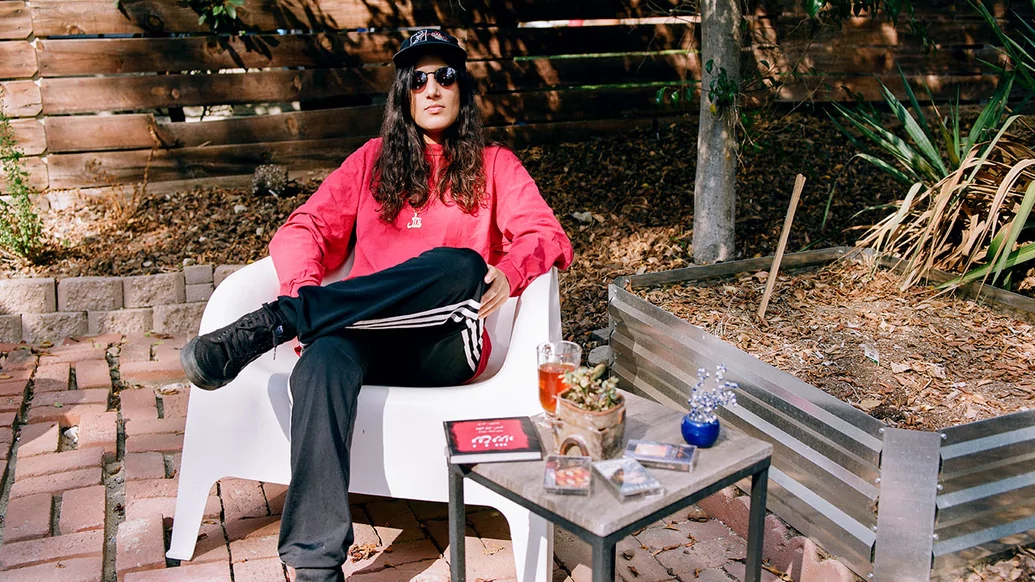
The life Maral has built in LA, and her participation in a welcoming, musically diverse scene, has instilled an optimism in her, which she feels has increasingly fed back into the music she’s been writing. Her new single, ‘wondering dub’, lurches playfully around a glitching Buchla melody and a ‘70s Persian pop sample, the lyrics from which Maral mimics and transforms with her own voice. “I love playing around with words and cutting them up to become something else,” she says.
A forthcoming track, ‘setar rock’, is a psychedelic jam that wields all the heft of her previous work, albeit with a lighter step. “I very rarely now make music from a point of sadness,” she says. “I'm definitely focused more on making more shimmery uplifting music.”
Maral’s releases have often referenced music of resistance; she even collaborated with legendary punk band Crass’ Penny Rimbaud on 2020’s ‘They Not They’, and sampled dub pioneer Lee “Scratch” Perry on the overtly anti-authoritarian, anti-corruption cut ‘Protect U’. In the context of recent demonstrations in Iran, which have seen thousands of women protesting for their rights against the government and “morality police”, in whose custody 22-year-old Mahsa Amini died in September 2022 after being arrested for allegedly wearing her hijab incorrectly, does Maral feel her music’s air of resistance carries more weight than before?
“I feel like just existing as an Iranian is kind of an act of resistance towards so many different things,” she says. “It's a part of being an Iranian woman, and being an Iranian in general. It’s just ingrained in you. The whole point of using folk and classical music in the beginning was to show people different parts of Iran, and to show that there is more to being Iranian than what is in the news. Look at this beautiful, rich culture that's based in music and poetry.”
“That felt really important to me to showcase,” she continues. “The beauty that I've learned about from my family by going to Iran every year, and the resistance that that beauty requires, the perseverance that that beauty requires. No matter what is going on in Iran, whether it's the economy, the oppression, whatever, my family still finds beauty, and they still find things to be so positive and enriched about... Utilising music and utilising poetry to fight against the darkness.”
Looking ahead, Maral is hoping to collaborate with more artists, and venture further into remixing. She also has some big shows coming up, including three dates playing live in support of Animal Collective’s Avey Tare. One of those dates will be in naturem, amongst the California redwoods of Big Sur, an ideal location for her to support one of her biggest musical inspirations. “Doing these meaningful things is what this whole artist project is about to me,” she says. “It’s just about doing things meaningfully in my way, and seeing what sort of path I can create... I hope to just continue being able to build my world through these little things that are significant to me. Your own version of success is what matters. We'll see what else I can accomplish.”
Listen to Maral's Fresh Kicks mix, and check the tracklist, below.
Tracklist:
Hayedeh Norooz broadcast
Isao Tomita ‘Clair de Lune, No. 3’
Joseph Campbell ‘Hidden Dimensions’
Hayedeh & Mohammad-Reza Shajarian ‘Khalvate Del (Dastgahe Mahour)’
Bergsonist ‘Korade’
Lolina ‘Wheel Up My Tune!’
DJ Narciso ‘ARMADILHA NO T’
Eric B. & Rakim ‘Paid in Full’
M.E.D., Blu, Madlib ‘The Stroll’
Farucox ‘ESFREGA [Ti Lito]’
Ms. Jade ‘Big Head’
Maral ‘wondering dub’
Cakedog ‘Hollywood Hoe’
DJ Patrick ‘Come On Asshole’
Nick León x Luca Durán ‘Joga Bola’
Digital Mystikz ‘Misty Winter’
JWords ‘Untitled 4’
Cakedog ‘I Got Em’
Khotin ft. Tess Roby ‘Fountain, Growth’
Maral ‘setar rock (demo)’
PJ Harvey ‘Lying In The Sun’
Black Rave Culture ‘Deep Breathing’
Maral ‘Avaz-e-Del’
Arca ‘Mequetrefe’
Les Rallizes Dénudés ‘夜の収穫者たち (Reapers of the Night)’
Maral ‘Heart Shimmer’
Rahill ‘Fables ft. Beck’
Hayedeh ‘Bahar Bahar’
Arthur Russell ‘Arm Around You’
Luis ‘jack anderson’
Joe Meek & The Blue Men ‘Love Dance Of The Saroos’

